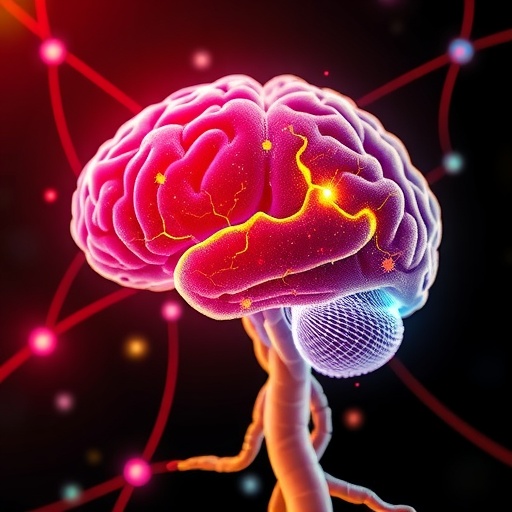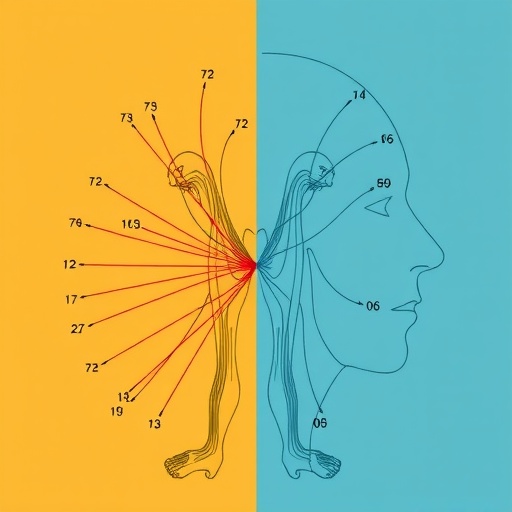PROTECT YOUR DNA WITH QUANTUM TECHNOLOGY
Orgo-Life the new way to the future Advertising by AdpathwayRecent research has shed light on the intricate relationship between mental health and dietary behaviors, specifically focusing on how food disgust can act as a mediator between mental health disorders like depression and anxiety, and avoidant restrictive eating patterns. In a study conducted by a team of researchers led by Chammas et al., published in the Journal of Eating Disorders, they explored this complex interaction, providing critical insights that could influence future therapeutic approaches for individuals struggling with both emotional distress and eating issues.
The connection between mental health and eating behavior is increasingly being recognized as a two-way street. On one hand, those suffering from conditions like depression and anxiety often find that their eating habits, specifically restrictive or avoidant patterns, worsen their mental health. Conversely, negative feelings towards food or eating can further exacerbate these mental health conditions, creating a vicious cycle that’s hard to break. This gripping study proposes that food disgust could be a key factor that binds these two issues together, offering an innovative perspective on treatment strategies.
Food disgust, an emotional response characterized by revulsion towards certain foods, can be influenced by a variety of factors including previous traumatic experiences or cultural beliefs. In individuals grappling with depression and anxiety, this disgust can become heightened, leading to a decreased willingness to engage with food, subsequently resulting in avoidant restrictive eating. This novel framework conveys the urgency of addressing food-related distress in therapeutic settings, suggesting that interventions focused on reducing food disgust may be pivotal in alleviating both psychological and eating-related concerns.
The researchers used a large sample size for their study, which enhances the reliability of their findings. By gathering data from various demographic backgrounds, they were able to draw more generalized conclusions about the population at large. They measured levels of depression and anxiety among participants, along with their attitudes towards food, specifically focusing on disgust. This comprehensive methodology adds weight to their claims, reinforcing the significance of food disgust as a variable in understanding the relationship between mental health and eating behaviors.
A crucial aspect of the study involves differentiating between types of restrictive eating. While some individuals might choose to adopt restrictive eating patterns as a lifestyle choice, driven by preferences or beliefs, others may do so as a manifestation of their mental health struggles. By highlighting food disgust as a mediating factor, the authors urge clinicians to take a more nuanced approach. Instead of viewing restrictive eating as simply a symptom of a diet trend, they advocate for a deeper exploration into the emotional underpinnings that might drive a patient’s relationship with food.
The implications of these findings extend beyond academic curiosity; they could potentially inform clinical practices. For instance, treatment strategies for individuals with avoidant restrictive eating patterns might benefit from integrating psychological interventions aimed at addressing disgust related to food. Cognitive-behavioral therapy practices could be customized to tackle specific food aversions that stem from underlying mental health issues. By doing so, therapists could pave the way for clients to achieve a more balanced and healthier relationship with food.
Furthermore, the study highlights the importance of psychoeducation in disseminating knowledge about the emotional aspects of eating. Individuals dealing with mental health challenges may not always be aware of their food-related feelings, often attributing avoidance to other lifestyle outside factors. Providing education about food disgust could serve as a vital step towards self-awareness, giving patients the tools to articulate their struggles and work through them with their healthcare providers.
Encouragingly, the findings of this study echo previous literature that also underscores the critical interplay between emotions and dietary choices. It reinforces the growing consensus that nutrition is not simply a physiological concern but deeply intertwined with psychological well-being. By acknowledging this connection, both mental health professionals and dietitians can collaborate more effectively, creating a holistic model of care that addresses both mind and body.
The researchers also call for further investigation, noting that although their study establishes a significant link between these variables, more extensive longitudinal studies are necessary to determine causality. For instance, it would be beneficial to explore whether interventions aimed at reducing food disgust result in measurable improvements in mental health and eating behaviors over time. Long-term studies could provide greater insight into the dynamic nature of food attitudes and their psychological underpinnings.
Another intriguing element of their findings is the recognition of cultural differences in food disgust and eating practices. The subjective nature of disgust can vary significantly across cultural contexts, implying that universal treatment practices may not be effective for everyone. Understanding these cultural nuances could allow for more tailored approaches in therapy, making it essential for practitioners to consider the cultural backgrounds of their clients when discussing food and eating behaviors.
In addition to clinical implications, this research opens the door for public health initiatives aimed at raising awareness about the effects of food aversion and mental health. By addressing these issues in community settings, stakeholders can foster environments that promote healthy eating habits while also encouraging open discussions about emotional well-being. Campaigns could focus on reducing stigma around mental health and eating issues, allowing individuals to seek help without fear of judgment, thereby improving overall public health outcomes.
The potential for increased collaboration between mental health and nutritional professionals is another vital takeaway from the research. The ability for nutritionists to identify signs of food-related distress, or for mental health practitioners to recognize how dietary practices may be influenced by an individual’s emotional state, could lead to more integrated care approaches. Establishing communication channels between these fields can enhance the supportive network available to patients, encouraging them to maintain healthier behaviors and improve their psychological states.
In essence, the findings from Chammas et al. extend an invitation to rethink our understanding of eating behaviors within the context of mental health. By centering the conversation on food disgust as a mediating factor, this research challenges existing paradigms and urges both clinicians and patients to reconsider their relationship with food. It encourages a fresh dialogue around how emotions can impact dietary choices and how addressing these emotions can offer new pathways to recovery.
As this important research continues to circulate among experts, it opens up exciting opportunities for future investigations. Researchers can build on this work to explore other mediating factors that might exist in the relationship between mental health and eating behaviors. New studies could examine whether factors such as social support or lifestyle changes also fit within this complex dynamic, thus expanding our understanding of the intricacies involved in mental health and nutrition.
Overall, the study conducted by Chammas and colleagues serves as a vital contribution to the ongoing discourse surrounding mental health and dietary habits. By illuminating the role of food disgust as a critical mediating factor, it lays foundational groundwork for future research and therapeutic approaches, guiding us toward developing effective interventions that can help those at the intersection of these challenging experiences. Engaging with these themes not only enriches our understanding of human behavior but also can potentially transform lives, leading to healthier communities and improved well-being.
Subject of Research: The mediating effect of food disgust between depression/anxiety and avoidant restrictive eating.
Article Title: Mediating effect of food disgust between depression/anxiety and avoidant restrictive eating.
Article References:
Chammas, G., Hallit, S., Abou Nader, L. et al. Mediating effect of food disgust between depression/anxiety and avoidant restrictive eating. J Eat Disord 13, 244 (2025). https://doi.org/10.1186/s40337-025-01430-8
Image Credits: AI Generated
DOI: 10.1186/s40337-025-01430-8
Keywords: food disgust, depression, anxiety, avoidant restrictive eating, mental health, eating behaviors, psychological treatment, nutritional counseling.
Tags: avoidant restrictive eating patternscultural beliefs and food disgustemotional responses to foodfood disgust and mental healthimpact of depression on dietary choicesinnovative treatment strategies for emotional distressinsights from the Journal of Eating Disordersrelationship between anxiety and eating behaviorresearch on food aversion and mental healthrole of trauma in food aversiontherapeutic approaches for eating disordersvicious cycle of mental health and eating


 6 hours ago
5
6 hours ago
5





















 English (US) ·
English (US) ·  French (CA) ·
French (CA) ·